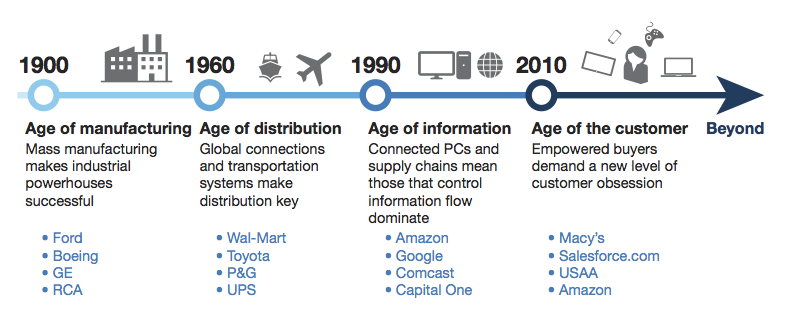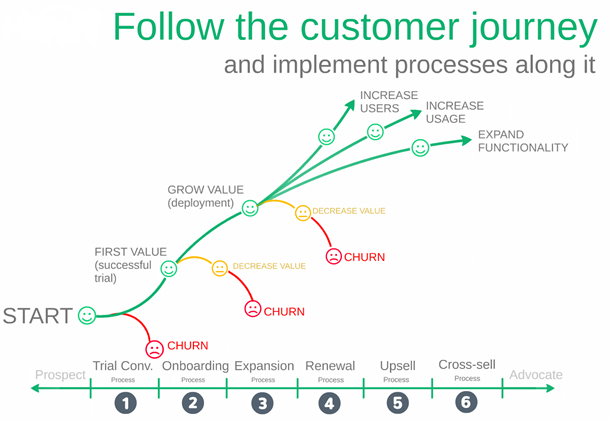You are missing the accomplished sales person who doesn’t want to hunt any more but possess the above attributes and then some. I like/thrive on touching revenue AND built serve. Guess there are a few unicorns out there.
Are You Built to Serve?

When your company’s business model is based on recurring revenue, you need tools to help your customer adopt your product quickly and realize its maximum value. This is the key to renewals and expansions, and why customer success departments are rapidly growing.
Lars Lofgren, Growth Manager at KISSMetrics, explains on Frontleaf that “Customers with a smoother transition into your product will integrate it more deeply into their lives. This means that they buy more frequently or stay subscribed. And when loyal customers hit a problem, it ensures that problem doesn’t drive them away.”
It truly has become the “age of the customer.”

Image: Forrester Research, Inc.
You have to put a customer success manager (and perhaps an entire team) in place whose job is to ensure the customer has reason to renew again and again. This team doesn’t just answer support tickets and show the customer around the interface. Their job is to help the customer realize maximum value from the product.
Succeeding in customer success requires more than hard work. The best customer success managers (CSM) require a special build. They are givers; constantly putting the needs of other people before their own. They feel a rush when they have the opportunity to help. They are built to serve.
Being built to serve means caring about the customer’s journey. Each customer will have their own journey, but they usually follow a similar path. At any point, the CSM’s role is to anticipate problems, solve them, and make the customer experience the product’s value. When the SaaS helps the customer succeed, the customer will continue to buy.

Image: For Entrepreneurs
CSMs are proactive by nature. They strive to improve the health of the customer. Health, of course, is best achieved when we actively maintain it. It needs constant checking and prodding to make sure all the pieces are working properly. Regular checkups can catch problems early, before the customer has suffered them too long.
Built to Serve vs. Built to Sell
On the other side of built to serve are those who are built to sell. Salesmen are built to sell. They enjoy the hunt; the chase. They like accumulating people and revenue numbers. They prefer to conquer, rather than uplift. They thrive on moving forward and closing deals.
Typically, people who are built to serve struggle in a selling environment. Similarly, salespeople flounder when they have to serve a customer. It’s not about laziness or inflexibility. These two groups of people are simply made differently. (They’re so different that companies need to actively put them on the same page.)
As someone who is built to serve, I have firsthand knowledge of this. Years ago, I worked in sales for Xerox. No amount of effort or education could make me a strong salesmen. My brain was just wired differently. My failures aside, just forcing myself to sell affected me emotionally. I was ignoring my strengths and fighting my own nature.
Identifying whether someone is built to serve or built to sell takes place through a simple interview. A few basic questions will tell you how they tick.
- “Where do you see your career heading?”
- “What motivates you in the morning?”
- “What are you most excited about with your work?”
- “What makes you anxious at work?”
- “What are your strengths and weaknesses?”
What Makes Someone Built to Serve?
You can’t just appoint anyone your customer success manager. You have to make sure the person is built with these abilities.
1. Communication skills
It should be no surprise that CS is all about communication. The CSM frequently stands between the customer and the sales team, development team, and customer service.
He needs practiced language skills that turn complaints into opportunities to strengthen the customer/SaaS relationship. He needs to ask thoughtful questions that gather meaningful information and cut to the heart of problems. (These skills are especially important if the CSM can only reach the customer once or twice a year.)
2. Empathy
Before a CSM can solve problems, he has to find them. A customer’s problem is not always what they think. A CSM has to get to the root of the problem, isolate the disease from the symptom so they know what to solve. He also needs to genuinely want to help the customer. He has to read and react to customer feelings. Manufactured empathy only goes so far. It needs to be real.
3. Managing expectations
CS and sales often but heads because the sales team makes promises the product and customer support can’t deliver. The CSM has to carefully manage the customer’s expectations without turning them off from the product. If something can’t be done, the CS has to be honest about it, but then find a way to replace the lost value.
4. Love for teaching
At its core, much of CS is teaching. It’s teaching customers how to use the product so as to meet their goals. This means being patient, clear, and willing to answer endless questions.
5. Strategic thinking
A CSM needs to have a high-level view of the department’s purpose and the customer’s needs. He must be able to anticipate problems, have solutions ready beforehand, and see multiple steps ahead. The CSM must know how to build processes and blend business goals with the customer’s needs.
6. Responsiveness
An unresponsive CSM will quickly disappoint any customer. It’s not that many CSM’s are lazy, but that they don’t have solutions ready. Each time a problem arises, they have to put out a fire again. By having a process ready, it’s simple to solve common problems or point customers to the right resources. Once the CSM builds an arsenal of tools, he’ll become a quick problems solver.
7. Technical skills
It isn’t necessary for a CSM to come from a technical background, but they should have some technical literacy, even if it’s just with the product’s software stack. He may not have to answer technical questions, but at some point he’ll need to effectively work with the development teams to solve a problem.
8. Social skills
At this level of work, everyone should be comfortable in social settings, but this is still worth mentioning. A CSM can’t be afraid of phone calls, new people, or new ideas. He needs to know how to build relationships quickly and support those relationships. Scripts are helpful in many situations, but they can’t be the only way to talk with customers. Don’t forget to be human.
9. Understanding of data
It’s a data-driven world now. A strong CSM needs to understand and measure retention, churn, and customer consumption. He’ll need to be able to look at financial data, billing data, and product development data, and then relate those metrics to the customer’s experience. A customer complains the billing is inconsistent; the CSM should investigate. A customer complains the updates happen at inopportune times; a CSM should look in on that.
10. Work/life balance
Handling other people’s problems every day can be draining, even for those of us who are built to serve. It’s easy to become disappointed when you encounter another problem that, for instance, is caused by the customer not reading the documentation. A CSM needs to know how to stay productive without working 12 hour days and burning out. Life is just as important as work.
11. Constant learning
It doesn’t matter which discipline you work in, there is always more to learn. Always. A person who stops learning is actually regressing, because the people around him continue their educations. A CSM needs to absorb new information and ideas from every customer. He needs to challenge his own opinions every day and evolve his toolbox of solutions. He needs to dive into the customer’s business, learning everything he can, so as to solve their problems.
Going Forward
I don’t mean to imply that anyone who isn’t built to serve is deficient in some category. Not at all. There are many people who don’t have customer success skills, but play critical roles in the success of a SaaS business. It’s important, however, to honestly identify the skills and talents of each person (ourselves included) to make sure they’re playing the right role.
We can help you determine if you or someone with your company is built for customer success. Contact us to get started.
